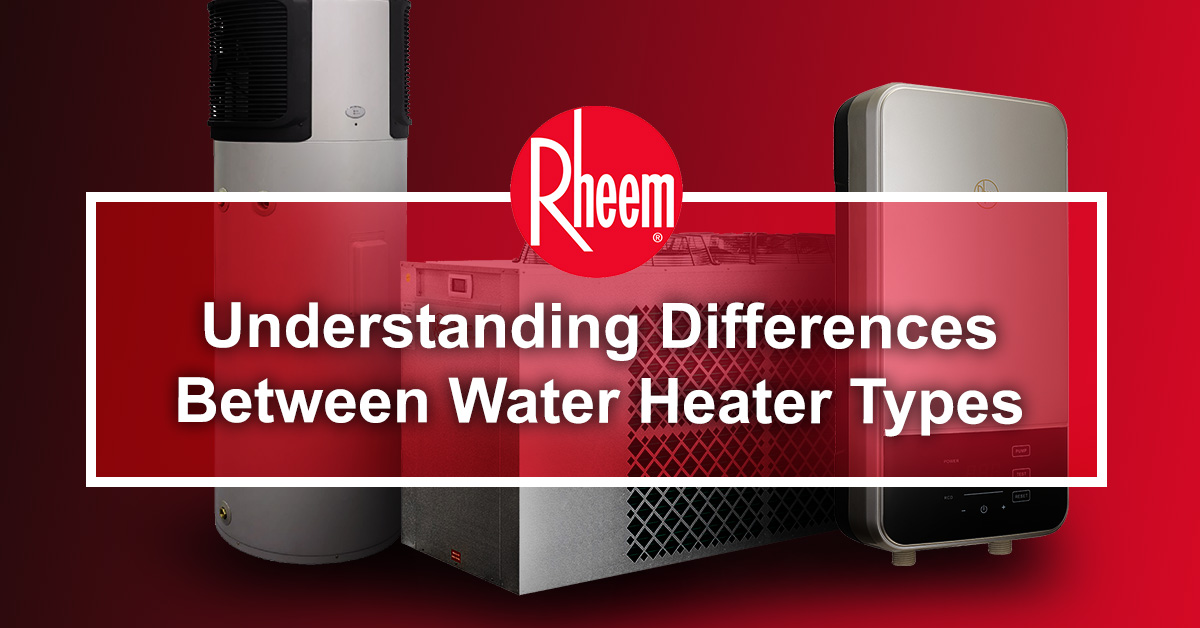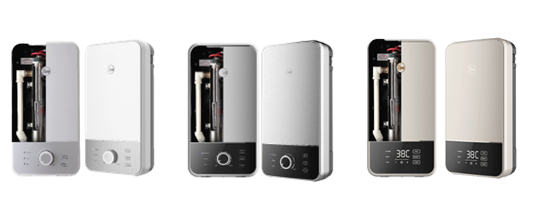
With the many benefits that warm water provides, it is no surprise that the sales of water heating solutions are increasing steadily in the Philippines. Installing a water heater in your household helps to eliminate the hassle of needing to heat water manually through stoves or electric kettles for showers or baths.
With the advancement in technology, water heaters can deliver on-demand warm water directly to faucets and shower heads. With this upgrade, individuals can save more time and money when going about their daily tasks – which include the need for hot water – while ensuring that less electricity and gas are used to boil the water consistently.
Since the introduction of water heaters in the market, many new, more advanced, and different types of water heating solutions have been produced. Now, customers can enjoy a greater variety of options to choose from when looking to install a water heating solution in their household. While there is no one solution to every individual’s needs, purchasing the wrong water heating solution can result in unnecessary financial implications.
Therefore, learning more about the differences between various water heater types can be a game changer for countless homeowners. This will allow homeowners to understand how each water heater type works and which type can better meet their demand for warm water on their property. In addition, it will better assist consumers in more accurately planning for other vital factors, such as space, infrastructure, and electricity costs.
So, to better help you decide which Rheem water heating solution would suit you best, here is what you need to know about the different water heater types available.

Storage Water Heaters
Storage water heaters – or also known as tank water heaters – are conventional water heating units. This type of water heater is one of the most popular water heaters in many parts of the world. The storage water heater is equipped with a sizeable, insulated tank that always keeps the stored water in the tank warm. Because of the insulated tank, individuals can conveniently access warm water whenever needed. A typical storage water heater can hold anywhere from 20 to 80 gallons of warm water in its tank, giving homeowners a sufficient supply of heated water to cater to their different water heating needs. Additionally, since storage water heaters have insulated tanks to store heated water for extended periods, it is a good water heating solution for countries like the Philippines, where typhoons usually result in blackouts and electrical shortages.
A storage water heater works by heating the cold water that enters the tank from the bottom of the water heating unit to the set temperature on the appliance. The tank’s insulation allows the unit to retain heat longer, even when the appliance is not in use. While this ensures that consumers can enjoy hot water for their shower and baths when needed, it would also result in higher electricity bills, as the water heater is most likely kept powered on 24/7.
Another prime benefit of investing in conventional storage water heaters is their low upfront cost. Consumers will not need to spend an extravagant amount on the appliance and installing the water heating unit in their house. Also, storage water heaters do not require much maintenance work, assuming normal appliance usage.
Despite the benefits and advantages consumers can enjoy from a storage water heater, these water heating appliances still have some downsides. For starters, storage water heating units usually take up a significant amount of space, especially the older and more traditional models. Because of this, homeowners must designate enough space in their house to accommodate the appliance. Moreover, energy costs may significantly increase if the unit constantly runs to keep the water heated at a specific temperature. Furthermore, storage water heaters are prone to corrosion as they store large amounts of water in their tanks. These appliances are also particularly prone to rusting and tend to deteriorate quicker in areas with a high concentration of hard water or when the water heater is not maintained regularly. As such, storage water heaters have a shorter lifespan than instant water heaters.
Rheem’s water heaters are available in various builds, capacities, and functionalities. With Rheem Philippines’ extensive range, our customers have the opportunity to select a storage water heating solution that suits their needs best.
Rheem’s storage water heaters have an enamel coating on their inner tank to help prevent corrosion from occurring. The water heating appliance is also equipped with a high-quality, durable, and reliable Incoloy heating element, which helps heat the water in the storage tank faster and is more resistant to high-temperature corrosion.
Heat Pump Water Heaters
The way a heat pump water heater works can be likened to that of a reverse refrigerator. A refrigerator will pull hot air from inside the appliance and send it out into the surroundings to keep the inside cold. Thus, in a similar concept, the heat pump will extract hot air from the surroundings and use it to heat the water inside the appliance. A heat pump differs from a conventional water heating appliance because a traditional water heater directly warms the water with an inbuilt heating element. In contrast, the heat pump would direct the external heat into the cold water in the tank to heat it to the desired temperature set on the appliance.
The heat pump’s ability to utilize the surrounding heat and move the heat from one place to another makes it a more energy-efficient option for countless consumers, as it can cut down electrical use by up to 60 percent. This would be an excellent choice for households with enough space on their properties and homeowners who are interested in saving more money in the long run.
Unlike storage water heaters, where the water inlet and outlets are usually placed at the top of the appliance, the heat pump water heaters typically have them located at the side of the appliance. This is because the top part of the heat pump water acts like an air conditioner and pulls humidity from room air into the evaporator coil. The heat will become a refrigerant, which will then become a vapor due to heat. The compressor will then send the vapor through compressor coils usually placed around the insulated tank.
Apart from saving money, the efficiency of heat pump water heaters makes it a first-rate solution for many families. Any heat in the air, even waste heat from furnaces, can be used to make the water in the heat pump warm. This lowers the electricity bills and makes the heat pump units durable and long-lasting. Rheem’s heat pumps come with a magnesium anode rod that helps prevent internal corrosion and has a freeze protection system that can avoid frost inside the heater, especially during the cold season. In addition, heat pumps are also more environmentally and family friendly as they do not produce as much heat. Its external components also do not get too warm, which is ideal for those who have kids or pets.
However, hybrid water heaters have more significant upfront costs despite their advantages and benefits. Purchasing a unit can easily cost thousands and installing the water heater also costs a considerable amount. And, since heat pump water heaters use humidity from surrounding air, the hybrid heating units can be hard to operate in cold climates. In contrast, tropical countries like the Philippines can significantly benefit from this type of water heater.
Are you looking to install a heat pump or water heater in your home? Rheem’s HDI Series All in One Heat Pump Water Heating units have a power supply of 220V – 50Hz and a rated HP Heating Capacity of 2590 watts. It does not need direct exposure to sunlight to operate, making it an ideal water heating solution for any time of the day. In addition, Rheem’s heat pump water heater also has a Top-Down Heating design which helps deliver a concentrated volume of water that anyone can use immediately.

Tankless Water Heaters
As having a hot water supply on-demand became a necessity in many households, water heating technology evolved to better cater to the needs and demands of customers. Thus, came the introduction of tankless water heaters – also known as instant or on-demand water heaters.
As the name implies, tankless water heaters do not store heated water in insulated tanks. Instead, it heats the cold water as it passes through the unit. The unit’s heating element will quickly warm the water once it enters the heat exchanger. This ensures that there will be an unlimited supply of heated water coming out from the water heater, even when used continuously.
The absence of tanks makes instant water heaters a compact solution for households with space constraints. Tankless heaters do not take up too much space, making them an ideal water heating appliance to install on a single bathroom wall. It is also less prone to leaks or corrosion as it does not store water, leading to a longer lifespan of up to 20 years. In addition, it has better energy efficiency as it does not need to work around the clock to keep stored water warm.
However, instant water heaters are usually more costly. The water heating unit and the installation can cost a hefty amount. This is because each instant water heater would need to be installed in each household bathroom as they can only provide hot water to one shower.
Additionally, a phenomenon called the ‘Cold Water Sandwich’ may occur with tankless water heaters. The ‘Cold Water Sandwich’ is when there is an inconsistent flow of warm water experienced when using the tankless water heater. For example, cold water may suddenly come out of the shower head during a shower, after which the hot water stream would return. In other cases, warm water may not instantaneously come out of the shower or faucet when the appliance is powered on and may take a few seconds before the heated water returns. While this may not be a significant inconvenience when using the shower or faucet for a short time, it may cause slight annoyance when using it for a longer shower.
If you are hunting for the best bathroom water heater on the market, why not choose Rheem? Our Prestige® series of electric instant water heaters is a cutting-edge, reliable, and sophisticated solution for all your warm water needs. This series comes with three models: the Prestige Instant Water Heater, Prestige Plus Instant Water Heater, and Prestige Platinum Instant Water Heater. All three tankless water heaters come with various shower handle spray modes and are equipped with a durable and robust Incoloy direct heating element that makes the heating process faster and protects the water heating unit from oxidation and other types of high-temperature corrosion.
Conclusion
Water heaters are not a small investment. Choosing the best water heating solution to meet your household’s needs takes time and research. After all, different types of water heaters have other functionality, bringing different experiences and meeting the diverse needs of consumers.
With Rheem’s water heating solutions, you are guaranteed the most satisfying hot shower experience. With almost 100 years in the water heating industry, Rheem has constantly focused on innovating and creating more advanced, high-quality, and intuitive water heating solutions to suit our customer’s unique needs. With Rheem, you can enjoy reliability, durability, and functionality.
Browse our extensive range of water heater models and learn more about the types of water heaters Rheem has available on our website. For any inquiries or more information about our products, you can also talk to one of our representatives by clicking here.
Subscribe

At Rheem, we strive to innovate
best-in-class products to lead the industry
in
environmental improvements.
Sustainability